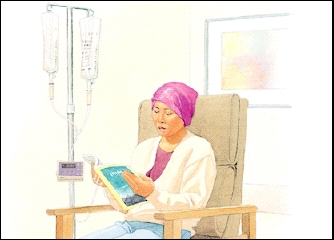Chemotherapy for a Brain Tumor
Chemotherapy is a way of treating disease with medications. It may be given as a single medication or a combination. It may be used alone or along with surgery or radiation therapy. Knowing what chemotherapy does, how it is given, and how to cope with possible side effects can be helpful.

Your IV treatment may last up to 8 hours, depending on the number of drugs given.
How Chemotherapy Works
Both normal and cancer cells grow and divide. But cancer cells grow, divide, and spread out of control. Chemotherapy kills growing cells by interrupting their life cycle. Because it acts on normal cells as well as cancer cells, side effects result. Fast-growing cells-such as those in the hair, digestive system, and blood-are most affected.
How Chemotherapy Is Given
Chemotherapy is given in cycles. This allows the body to rest and build healthy cells between treatments. You can receive your therapy:
Coping with Side Effects
Chemotherapy can cause side effects in different parts of your body. Here are some common short-term side effects and tips that may help control them.
For Nausea or Vomiting
For Low Blood Cell Counts
-
A low white blood cell count makes your body less able to fight infection. Wash your hands often. Avoid crowds and people who are sick.
-
A low platelet count increases the risk of bleeding. Avoid activities that could result in cuts or bruising.
-
A low red blood cell count, or anemia, may require treatment. Call your doctor if you are very tired and pale, short of breath, or have chest pain.
For Hair Loss
-
Cut your hair short to make hair loss less extreme.
-
Wear a wig, hat, or scarf.
Mouth Sores
Long-term side effects and risks are infertility, organ damage, and numbness and tingling in the hands and feet.












